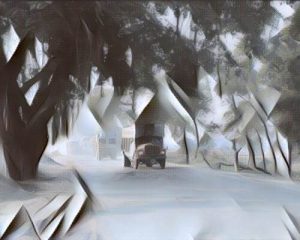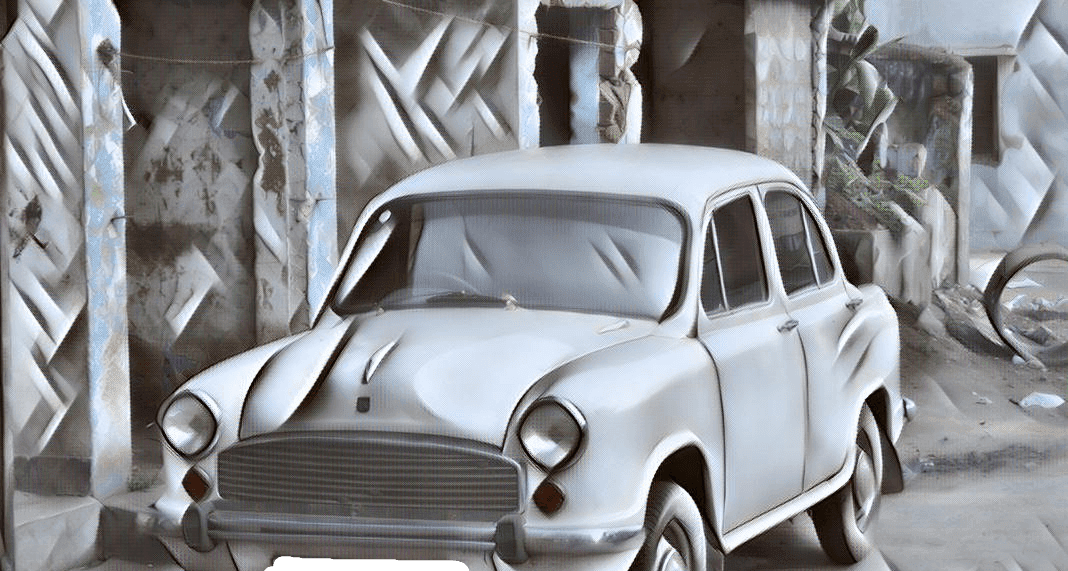Reading Time: 5 minutes
Soumya travels down the memory lane of his childhood and visits his ancestral village many moons later. He records his impressions of then and now. An exclusive for Different Truths.


We were going to our grandparents’ country home, an annual ritual in winter, when the harvest came in, the weather was cool, and the mood festive.
My grandfather was a retired civil servant, a relic of the British Raj, who spent his winters playing landed gentry.
My grandfather was a retired civil servant, a relic of the British Raj, who spent his winters playing landed gentry.
This little break from our daily routine in the urban jungle was a breath of fresh air when we met Bharat at close quarters and breathed in the fresh air of the countryside with a lot of dust thrown in for free. But the scent of the earth was pleasant and far from the stink of sooty urban pollution.
The farm had no electricity, all the village roads were kucha and my grandfather’s house was the only brick building in a village of thatched mud huts, interspersed by bamboo groves, ponds and deep-green shrubbery.
The farm had no electricity, all the village roads were kucha and my grandfather’s house was the only brick building in a village of thatched mud huts, interspersed by bamboo groves, ponds and deep-green shrubbery.
We spent the winter days playing hide and seek amongst the haystacks, learning to climb trees, exploring the fields and tasting guavas plucked straight from the trees and sugarcane cut straight from the field. It was also a gastronomic holiday with umpteen preparations of freshly caught fish of diverse varieties and organically grown vegetables from the kitchen garden.
After graduating high school and before joining college, I took a break to travel and spent a month of summer in this idyllic retreat. I learnt to swim in a pond, which let me assure you is a vastly different skill from swimming in a sanitised swimming pool, as I learnt the hard way. I also learnt to shoot a rifle courtesy my grandfather and shoot arrows courtesy his tribal farmhands. I devoured his library often sitting in the branches of a shady tree. I also introduced the village children to cricket and badminton, which had not percolated into the grassroots in the days before television. In exchange, I learnt kabaddi and gulli danda, games that were strictly rural in those days.
After graduating high school and before joining college, I took a break to travel and spent a month of summer in this idyllic retreat. I learnt to swim in a pond, which let me assure you is a vastly different skill from swimming in a sanitised swimming pool, as I learnt the hard way. I also learnt to shoot a rifle courtesy my grandfather and shoot arrows courtesy his tribal farmhands. I devoured his library often sitting in the branches of a shady tree.
After moving out of Bengal for college, my work kept me away from home for the next quarter of a century. Then one year, it so transpired that I had to visit a client in Bengal and was travelling by road from Kolkata down GT Road to an industrial 

Flyovers had sprung up over the towns on the way and there was far more construction visible along the route. However, seeing the names of towns on the way I realised that we were approaching my childhood oasis of bliss. I kept a sharp lookout for the cupola of the family temple that used to be visible from the road. That was the sign for slowing down and getting into the dirt track. However, I could spot no such temple or track. When we reached the next major crossroads, I realised that we have gone passed the turn and asked my driver to turn around and drive slowly down the road. After a while, I found a narrow metaled road between rows of shabby brick houses, next to a general store flashing a Coke ad. On enquiry at the shop, I discovered that this street was the new incarnation of the country road of my childhood.
Going down the lane, I recognised nothing as the bamboo groves and ponds had disappeared to be replaced by houses and sheds. At the end of the lane, I found my grandfather’s house almost falling down. It was the most dilapidated house in the village.
Going down the lane, I recognised nothing as the bamboo groves and ponds had disappeared to be replaced by houses and sheds. At the end of the lane, I found my grandfather’s house almost falling down. It was the most dilapidated house in the village.
Someone came out seeing the car and I recognised him as the middle-aged version of a young boy, who worked on the farm. He greeted me warmly and told me that he was the Manager now. I looked around sadly as the cowsheds, haystacks, yard, kitchen garden and pond had all been replaced by barrack-like structures, which he explained was hostels given on rent to the factory workers in the area.
Some more people gathered around the car and another middle-aged man came and introduced himself as the boy, who would take the cattle out to graze when we were young and he remembered teaching me how to climb trees and me teaching him how to play cricket. He said that he now ran a video parlour and had a cable TV business. The large lake – our source of fish was now a telephone exchange, and the bamboo grove, which was the public open-air toilet was now an English Medium School run by a boy, who had been taught English by me during that long summer break.
The large lake – our source of fish was now a telephone exchange, and the bamboo grove, which was the public open-air toilet was now an English Medium School run by a boy, who had been taught English by me during that long summer break.
A matronly lady turned up and introduced herself as the young girl who had 

I could not stay long and in fact, did not want to as happy as I was to see the economic progress made by my companions of childhood; I bemoaned the loss of the idyll of my youth. I had noticed the same when I visit Goa, Andamans, Darjeeling, Puri, Shimla and all other holiday destinations, which were so wonderful and exotic in childhood and are now crowded, overbuilt market places chocked with people and where nature has withdrawn in defeat. But it really hurt to see my childhood memories of this rural retreat where I came up for air also going the same way. I felt chocked.
I could not stay long and in fact, did not want to as happy as I was to see the economic progress made by my companions of childhood; I bemoaned the loss of the idyll of my youth. I had noticed the same when I visit Goa, Andamans, Darjeeling, Puri, Shimla and all other holiday destinations, which were so wonderful and exotic in childhood and are now crowded, overbuilt market places chocked with people and where nature has withdrawn in defeat.
Is there no place I can come up for air?
Photo from the Internet
















